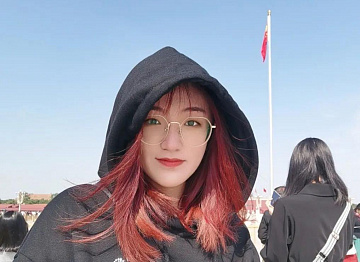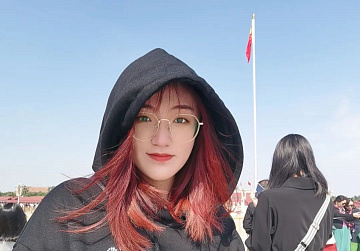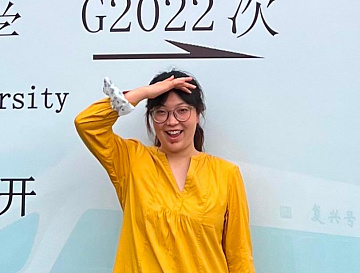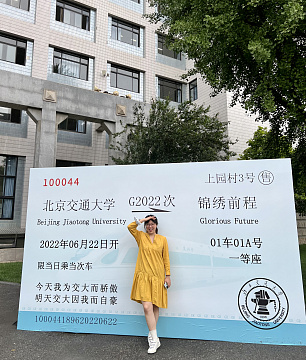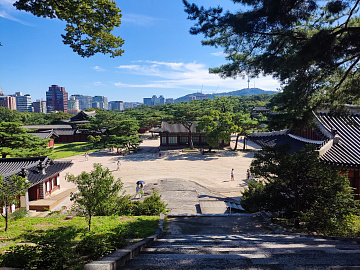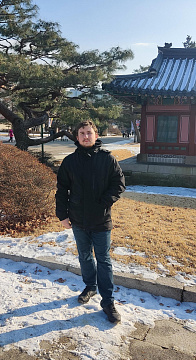2021-2022, Ma Yiting 

Not only learned about the differences between Chinese and Russian education, but also made friends there...
What have you achieved?
I appreciate the exchange experience. It's a great opportunity. Through this chance, I developed more regular learning habits and learned about China's university education system. During the one-year exchange study in Beijing Jiaotong University, I successfully improved my learning ability and had a clearer goal for the future. Through various courses, I have learned a wealth of knowledge. I worked with students from Beijing Jiaotong University to do group work, which enhanced my practice of cooperative learning and improved my communication skills.
Can you provide suggestions for future academic mobility program participants?
In the early stage of exchange study, we first need to adapt to the learning environment there. Secondly, we should get to know the students of Beijing Jiaotong University quickly so that we can do group work together. In addition, we need to master the teaching methods there as soon as possible and adjust the learning style. Although, we ran into some problems. But counselors and teachers helped us solve these problems as quickly as possible and fit us into the college environment. My advice to future participants in academic mobility programs is not to be afraid of questions and obstacles, but to actively engage with teachers who will help you.
Describe your visa process.
Since I am a Chinese national, I do not need to apply for a visa for exchange study in China. However, if necessary, you can find the relevant documents for visa processing on the official website of the embassy.
Difficulties did you encounter when you came to overseas institutions?
I did not encounter any major difficulties in my exchange study at Beijing Jiaotong University. However, due to the pandemic, we delayed the opening of the school and prepared many procedures, such as nucleic acid certificate and vaccine certificate. Also, I suggest you bring some bedding and short-term toiletries, in case you don't have time to pick them up during your first days on campus.
About cost of the overseas internship
I don't need to apply for a visa, so I'm not sure about the fees. I took the high-speed train to Beijing. The ticket cost about 400 yuan. The accommodation is very good and the living expenses are about 2000 yuan a month. Textbooks can be purchased online or in the school second-hand group, which is very convenient. As for the food, I am a little worried about it, but the school provides a halal canteen, which is very convenient for me. Transportation, out of the subway and bus, very convenient. Ticket prices are based mainly on distance. As long as you do not often go out to spend, shopping, will not have too high expenses.
What have you achieved?
I appreciate the exchange experience. It's a great opportunity. Through this chance, I developed more regular learning habits and learned about China's university education system. During the one-year exchange study in Beijing Jiaotong University, I successfully improved my learning ability and had a clearer goal for the future. Through various courses, I have learned a wealth of knowledge. I worked with students from Beijing Jiaotong University to do group work, which enhanced my practice of cooperative learning and improved my communication skills.
Can you provide suggestions for future academic mobility program participants?
In the early stage of exchange study, we first need to adapt to the learning environment there. Secondly, we should get to know the students of Beijing Jiaotong University quickly so that we can do group work together. In addition, we need to master the teaching methods there as soon as possible and adjust the learning style. Although, we ran into some problems. But counselors and teachers helped us solve these problems as quickly as possible and fit us into the college environment. My advice to future participants in academic mobility programs is not to be afraid of questions and obstacles, but to actively engage with teachers who will help you.
Describe your visa process.
Since I am a Chinese national, I do not need to apply for a visa for exchange study in China. However, if necessary, you can find the relevant documents for visa processing on the official website of the embassy.
Difficulties did you encounter when you came to overseas institutions?
I did not encounter any major difficulties in my exchange study at Beijing Jiaotong University. However, due to the pandemic, we delayed the opening of the school and prepared many procedures, such as nucleic acid certificate and vaccine certificate. Also, I suggest you bring some bedding and short-term toiletries, in case you don't have time to pick them up during your first days on campus.
About cost of the overseas internship
I don't need to apply for a visa, so I'm not sure about the fees. I took the high-speed train to Beijing. The ticket cost about 400 yuan. The accommodation is very good and the living expenses are about 2000 yuan a month. Textbooks can be purchased online or in the school second-hand group, which is very convenient. As for the food, I am a little worried about it, but the school provides a halal canteen, which is very convenient for me. Transportation, out of the subway and bus, very convenient. Ticket prices are based mainly on distance. As long as you do not often go out to spend, shopping, will not have too high expenses.
2021-2022, Li Chao 

Beijing Jiaotong University is a university with high quality teaching, so I was honored to be able to study there as an exchange student. During the study period, I experienced a lot of interesting things. I learnt not only a lot of professional knowledge, but at the same time, my mentality was improved. This experience also had an impact on my study planning afterwards, allowing me to better think about how I should study in the next time and which area I should focus on for my research.
Main challenges did during the preparation stage
At first, I was worried that I would not be able to integrate well into BJTU because I was entering an unfamiliar environment. But when I arrived at BJTU, I found that my worries were superfluous because the teachers and students here are very welcoming. We arrived at Beijing Jiaotong University a few days later than the normal start time, so some classes were already in session. When the teacher of the relevant major course learned of this, she immediately contacted us, gave us the course materials for the few classes we had missed, and then told us to call her anytime if we had any questions. That's how we quickly made up for the knowledge we had left behind. So my advice is that when you arrive in an unfamiliar environment, don't be too nervous, communicate with the school and the teacher if you have any difficulties, and they will help you!
Visa process.
I'm Chinese and then I'm studying at a Chinese university, so I don't need to deal with visa stuff. If you want to know more about visa things, you can call and ask the consulate. Or even easier, you can find a good visa agency and they will help you.
Challenges after arriving to overseas institutions
In general I didn't have any very bad difficulties. If anything, I think it was during the time when the new coronavirus was severe. When I was studying at Beijing Jiaotong University, the new coronavirus was very serious, so we had to stay at school for a while. Under such circumstances, students inevitably felt very drained. But my friends and I were not unhappy about it. We often went for walks in the playground, played badminton, or sat on the playground reading extracurricular books and so on. You are bound to encounter some difficulties in your life as an exchange student, but I hope you will be able to make fun of the bitterness, even if you find things difficult at the moment, but keep an optimistic attitude, because the difficulties will be solved!
My cost during overseas internship
I'm Chinese, so I didn't need to get a visa or buy a ticket, etc. I went to Beijing Jiaotong University by high speed train and it cost about 200 RMB. During the exchange program at Beijing Jiaotong University, we basically ate in the cafeteria and it cost about 20-30 RMB a day. If we had to go out, we would take the bus, which cost about 10 RMB for a round trip. If we talk about tips to reduce the cost, I think we can take the bus more often and then take a cab when there are special circumstances. Then you can agree with your friends on the number of times to go out to parties, usually we eat in the cafeteria and occasionally go out to parties together.
Main challenges did during the preparation stage
At first, I was worried that I would not be able to integrate well into BJTU because I was entering an unfamiliar environment. But when I arrived at BJTU, I found that my worries were superfluous because the teachers and students here are very welcoming. We arrived at Beijing Jiaotong University a few days later than the normal start time, so some classes were already in session. When the teacher of the relevant major course learned of this, she immediately contacted us, gave us the course materials for the few classes we had missed, and then told us to call her anytime if we had any questions. That's how we quickly made up for the knowledge we had left behind. So my advice is that when you arrive in an unfamiliar environment, don't be too nervous, communicate with the school and the teacher if you have any difficulties, and they will help you!
Visa process.
I'm Chinese and then I'm studying at a Chinese university, so I don't need to deal with visa stuff. If you want to know more about visa things, you can call and ask the consulate. Or even easier, you can find a good visa agency and they will help you.
Challenges after arriving to overseas institutions
In general I didn't have any very bad difficulties. If anything, I think it was during the time when the new coronavirus was severe. When I was studying at Beijing Jiaotong University, the new coronavirus was very serious, so we had to stay at school for a while. Under such circumstances, students inevitably felt very drained. But my friends and I were not unhappy about it. We often went for walks in the playground, played badminton, or sat on the playground reading extracurricular books and so on. You are bound to encounter some difficulties in your life as an exchange student, but I hope you will be able to make fun of the bitterness, even if you find things difficult at the moment, but keep an optimistic attitude, because the difficulties will be solved!
My cost during overseas internship
I'm Chinese, so I didn't need to get a visa or buy a ticket, etc. I went to Beijing Jiaotong University by high speed train and it cost about 200 RMB. During the exchange program at Beijing Jiaotong University, we basically ate in the cafeteria and it cost about 20-30 RMB a day. If we had to go out, we would take the bus, which cost about 10 RMB for a round trip. If we talk about tips to reduce the cost, I think we can take the bus more often and then take a cab when there are special circumstances. Then you can agree with your friends on the number of times to go out to parties, usually we eat in the cafeteria and occasionally go out to parties together.
2021-2022, Ding Ruiyi 

What is the overall impression of the internship?
The experience of studying at Beijing Jiaotong University has been very helpful to me. During this time, I learned about a new teaching system and improved my academic level and developed good study habits. During this year, I learned not only about my major, but also got the opportunity to learn other professional knowledge. After studying different subjects, I got more clear about the direction I want to study in the future and what I am currently lacking. Especially through some essay assignments, my writing and logical thinking skills have improved and I understand more about how to write a good essay.
What difficulties did you encounter in the preparation stage of your internship?
I divided the preparation phase into two parts, one is preparing the application and the other is preparing to leave for the school.
During the application preparation phase, I struggled with the paperwork I needed for my application. Because you need to dig out the points that make you a good match for the school and say why you are the best person for the job, it takes some time, but it is not insurmountable. I suggest that when you write your essay, you can write down the characteristics that the school is looking for in a person, then go through and analyze whether you possess that characteristic and recall relevant examples to use to support it. When preparing to go to school, due to the epidemic, we need to prepare some documents and understand the epidemic prevention and control measures, but you don't need to worry about it, there are teachers to help you with these issues, and if you have other problems you can ask them for help and they will be happy to help you.
Describe your visa process. Provide suggestions for future academic mobility program participants.
Since I am Chinese and the school I applied to is in China, I don't need to get a visa. However, if you have questions about visas, you can consult the Chinese embassy in your area.
What difficulties did you encounter when you came to overseas institutions?
I didn't have any difficulties when I was at Beijing Jiaotong University. However, one small problem is that the campus is quite large and has several doors and buildings, which can make it easy to get lost when you first arrive. For this problem, the school may have teachers or classmates to show you around the campus, but I would prefer to use navigation software or a school map, which is much easier and faster.
Cost of my overseas internship
I don't need to get a visa so I don't know how much the visa fee is. It costs about 300 RMB to travel from my place to Beijing by high speed train. The dormitory is a double room with private bathroom, and there is a common kitchen on each floor, the dormitory fee is 6000 RMB per semester. In addition to that, the school will charge you a course selection fee based on the number of credits you take, which is 300 RMB per credit. In terms of living, you can take the bus and subway to get around, and the fare is usually only a few yuan. If you want to save money you can eat in the school cafeteria instead of ordering take-out and going to restaurants. Entrance fees to visit attractions in Beijing are also not expensive and there are some free attractions. All in all, it is possible to live on about 2000 RMB a month.
The experience of studying at Beijing Jiaotong University has been very helpful to me. During this time, I learned about a new teaching system and improved my academic level and developed good study habits. During this year, I learned not only about my major, but also got the opportunity to learn other professional knowledge. After studying different subjects, I got more clear about the direction I want to study in the future and what I am currently lacking. Especially through some essay assignments, my writing and logical thinking skills have improved and I understand more about how to write a good essay.
What difficulties did you encounter in the preparation stage of your internship?
I divided the preparation phase into two parts, one is preparing the application and the other is preparing to leave for the school.
During the application preparation phase, I struggled with the paperwork I needed for my application. Because you need to dig out the points that make you a good match for the school and say why you are the best person for the job, it takes some time, but it is not insurmountable. I suggest that when you write your essay, you can write down the characteristics that the school is looking for in a person, then go through and analyze whether you possess that characteristic and recall relevant examples to use to support it. When preparing to go to school, due to the epidemic, we need to prepare some documents and understand the epidemic prevention and control measures, but you don't need to worry about it, there are teachers to help you with these issues, and if you have other problems you can ask them for help and they will be happy to help you.
Describe your visa process. Provide suggestions for future academic mobility program participants.
Since I am Chinese and the school I applied to is in China, I don't need to get a visa. However, if you have questions about visas, you can consult the Chinese embassy in your area.
What difficulties did you encounter when you came to overseas institutions?
I didn't have any difficulties when I was at Beijing Jiaotong University. However, one small problem is that the campus is quite large and has several doors and buildings, which can make it easy to get lost when you first arrive. For this problem, the school may have teachers or classmates to show you around the campus, but I would prefer to use navigation software or a school map, which is much easier and faster.
Cost of my overseas internship
I don't need to get a visa so I don't know how much the visa fee is. It costs about 300 RMB to travel from my place to Beijing by high speed train. The dormitory is a double room with private bathroom, and there is a common kitchen on each floor, the dormitory fee is 6000 RMB per semester. In addition to that, the school will charge you a course selection fee based on the number of credits you take, which is 300 RMB per credit. In terms of living, you can take the bus and subway to get around, and the fare is usually only a few yuan. If you want to save money you can eat in the school cafeteria instead of ordering take-out and going to restaurants. Entrance fees to visit attractions in Beijing are also not expensive and there are some free attractions. All in all, it is possible to live on about 2000 RMB a month.
2021-2022, Bian Yufei 

1. My impression...
To my mind, my exchange life was an unpredictable and impressive journey. Not only did I get lots of friends fr om different countries, but also did I achieve my educational productivity. I got close to lots of Russian friends, they helped me to improve my Russian language. After that we have witnessed important moments together.
As for the education, I explored the differences between education in China and education in Russia. The teachers teach different majors under different cultures. The management system is also different. To some extent, I deepened my love for my profession and my confidence in exploring it. I think it was unexpected for me. In my 4th year study currently, I got my passion that continues with the study of international business related content and its development in the context of globalization, etc.
2. What difficulties did you encounter in the preparation stage of your internship? What advice and suggestions. Can you provide suggestions for future academic mobility program participants?
There are difficulties behind every successful achievement. When I entered the university, everything was not familiar to me, I had to put myself in a fresh new atmosphere.Most of my classmates were students who had already gone to school together for three years, and they knew each other very well; I came here as an exchange student, and I felt like an outsider. During our collaborative group work,it was incrediable difficult for me to find group to do presentation, cos students have formed before.<br>
The professors there were totally different, some of them didn’t care about the students’ learning Fundamentals of International Business, they spoke faster than I could imagine. But they were useful to me.
3. Describe your visa process. Provide suggestions for future academic mobility program participants.
As I am Chinese, I don't need a visa. But as far as I know, you can find the documents you need for a visa in the list published by your embassy.
4. What challenges did you encounter when you came to overseas institutions?
I’m chinese,so I don’t have such overseas problems. But the important thing was, when we met problems, we should contact our university coordinators. As for program participants, please, be ready with the language wh ere you are, so that you can ask for help sooner. And always keep connection with tutors, if you got problem, go for them.
5. Cost of my overseas internship:
School Tuition:¥4000
Accommodation Fee:¥12000
Transport: ¥200*4= ¥800
Food: every meal about ¥2
School Tuition:¥4000
To my mind, my exchange life was an unpredictable and impressive journey. Not only did I get lots of friends fr om different countries, but also did I achieve my educational productivity. I got close to lots of Russian friends, they helped me to improve my Russian language. After that we have witnessed important moments together.
As for the education, I explored the differences between education in China and education in Russia. The teachers teach different majors under different cultures. The management system is also different. To some extent, I deepened my love for my profession and my confidence in exploring it. I think it was unexpected for me. In my 4th year study currently, I got my passion that continues with the study of international business related content and its development in the context of globalization, etc.
2. What difficulties did you encounter in the preparation stage of your internship? What advice and suggestions. Can you provide suggestions for future academic mobility program participants?
There are difficulties behind every successful achievement. When I entered the university, everything was not familiar to me, I had to put myself in a fresh new atmosphere.Most of my classmates were students who had already gone to school together for three years, and they knew each other very well; I came here as an exchange student, and I felt like an outsider. During our collaborative group work,it was incrediable difficult for me to find group to do presentation, cos students have formed before.<br>
The professors there were totally different, some of them didn’t care about the students’ learning Fundamentals of International Business, they spoke faster than I could imagine. But they were useful to me.
3. Describe your visa process. Provide suggestions for future academic mobility program participants.
As I am Chinese, I don't need a visa. But as far as I know, you can find the documents you need for a visa in the list published by your embassy.
4. What challenges did you encounter when you came to overseas institutions?
I’m chinese,so I don’t have such overseas problems. But the important thing was, when we met problems, we should contact our university coordinators. As for program participants, please, be ready with the language wh ere you are, so that you can ask for help sooner. And always keep connection with tutors, if you got problem, go for them.
5. Cost of my overseas internship:
School Tuition:¥4000
Accommodation Fee:¥12000
Transport: ¥200*4= ¥800
Food: every meal about ¥2
School Tuition:¥4000
2022, Pavel Prorubshchikov 

I studied for 4 months at Chung-ang University on the Seoul campus, which allowed me to meet many students not only from Korea, but also from other countries. This has significantly helped me improve my team interaction skills, as well as increased my English level. I really liked the organization of the educational process. I learned a lot of useful information. Despite the fact that Seoul is a huge metropolis, there are a lot of parks there, which makes it a very cozy and beautiful city. It was a wonderful trip!
About the difficulties at the stages of the internship
The biggest difficulty is to provide a bank statement on the availability of an amount equivalent to $ 6,000. Also, due to the lack of direct flights, we had to look for alternative options. “Irkutsk – Ulaanbaatar” train turned out to be the best, and then “Ulaanbaatar-Seoul” flight. I advise you to book a transfer to Ulaanbaatar Airport in advance.
The process of obtaining a visa
An appointment at the Consulate of the Republic of Korea in Irkutsk is made by e-mail.
It is necessary to fill out a questionnaire, prepare documents and a photo. When submitting documents at the consulate, you need to pay a visa fee.
Difficulties upon arrival at the host foreign organization
The dormitory of Chung-ang University does not provide a pillow, blanket and bed linen, so I advise you to come to the hostel in the morning to have time to buy everything you need.
Expenses related to participation in a foreign internship:
The visa fee at the Consulate of the Republic of Korea in Irkutsk is $ 80.
Tickets: 50,000 rubles
Dormitory: 1290000 won (70,000 rubles)
Metro fare: 1250 won (70rub)
Meals: 10000-20000 won/day (600-1200rub)
About the difficulties at the stages of the internship
The biggest difficulty is to provide a bank statement on the availability of an amount equivalent to $ 6,000. Also, due to the lack of direct flights, we had to look for alternative options. “Irkutsk – Ulaanbaatar” train turned out to be the best, and then “Ulaanbaatar-Seoul” flight. I advise you to book a transfer to Ulaanbaatar Airport in advance.
The process of obtaining a visa
An appointment at the Consulate of the Republic of Korea in Irkutsk is made by e-mail.
It is necessary to fill out a questionnaire, prepare documents and a photo. When submitting documents at the consulate, you need to pay a visa fee.
Difficulties upon arrival at the host foreign organization
The dormitory of Chung-ang University does not provide a pillow, blanket and bed linen, so I advise you to come to the hostel in the morning to have time to buy everything you need.
Expenses related to participation in a foreign internship:
The visa fee at the Consulate of the Republic of Korea in Irkutsk is $ 80.
Tickets: 50,000 rubles
Dormitory: 1290000 won (70,000 rubles)
Metro fare: 1250 won (70rub)
Meals: 10000-20000 won/day (600-1200rub)
Submit a review
Please leave your comments with photos regarding your exchange studies







